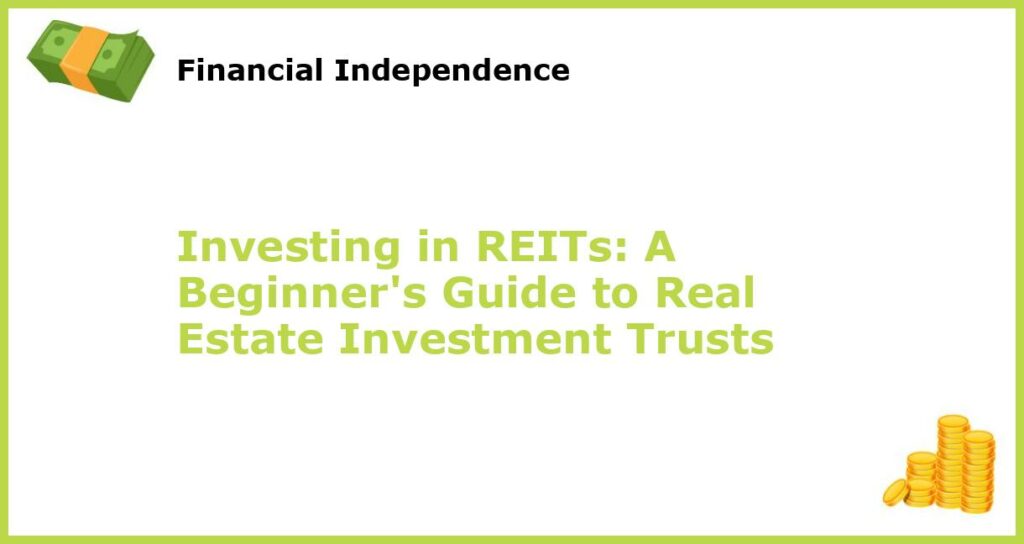Real Estate Investment Trusts or REITs are a popular investment option for those looking to diversify their portfolios and potentially earn regular income streams from real estate properties. If you’re new to REITs, it’s important to understand what they are, the different types available, their advantages and risks, and how to invest in them. In this beginner’s guide, we’ll cover all of these topics and more to help you make informed decisions when investing in REITs.
What are REITs?

REITs are companies that own or finance income-producing real estate, allowing individual investors to invest in real estate properties without actually purchasing, managing, or financing them. These companies can own a range of properties, such as apartment buildings, shopping centers, hotels, and office buildings. REITs generate income from the rent they receive from tenants or from interest on mortgages they hold. By law, REITs are required to pay at least 90% of their taxable income to shareholders as dividends. This means that investors can potentially earn regular income streams from REITs, making them a great source of passive income.
Different types of REITs

There are generally three types of REITs: Equity REITs, Mortgage REITs, and Hybrid REITs. Equity REITs own and operate income-generating real estate properties, while Mortgage REITs provide financing for income-generating real estate. Hybrid REITs are a combination of both types, owning and operating real estate properties while also providing financing. Equity REITs are the most common type of REIT and can provide investors with a steady stream of income from rent payments.
The advantages of investing in REITs

One of the advantages of investing in REITs is that they offer the potential for regular income streams with relatively lower risk than traditional stocks. This is because REITs are required by law to pay out at least 90% of their taxable income to shareholders as dividends. They also offer diversification in an investor’s portfolio since they are not closely tied to the stock market. Additionally, although real estate is generally considered a long-term investment, investors can buy and sell REITs like any other stock, making them a more liquid investment option.
Risks involved in investing in REITs

Like any investment, investing in REITs does come with risks. Interest rate sensitivity is one of the biggest risks, given that most REITs rely on debt to finance their portfolio. If interest rates rise, the cost of borrowing increases and the value of the properties owned by the REIT may decrease. Other risks include natural disasters or other unforeseen events that may affect the properties owned by the REITs and market fluctuations that may affect the value of the shares.
How to invest in REITs

Investing in REITs can be done like any other stock purchase through a brokerage account. Investors can also invest in REITs through mutual funds or exchange-traded funds (ETFs) that specialize in REIT investments. Before investing, it is important to do thorough research and analysis of the REIT considering the type of REIT, its performance history, management team, and potential growth opportunities. Like any investment, doing your due diligence can help mitigate risks and increase the potential for returns.
REITs in 2021

The COVID-19 pandemic has impacted the global economy, including the real estate market and REITs. While some REITs have struggled, others have managed to remain profitable and provide investors with steady dividends. With interest rates remaining low, investors may find REITs an attractive investment option given their yields and potential for growth. Although market conditions may change, long-term investing in REITs may continue to be a viable investment option for those looking to diversify their portfolios.
Tips for investing in REITs

Before investing in REITs, it’s important to have a diversified portfolio, understand the different types of REITs available, and their risk profiles. Investors should pay attention to the management team of the REIT and their previous performance history. In addition, analyzing the REIT’s financial statements can help assess its profitability and potential for growth. REITs are long-term investments, and it’s important to remain patient and stay focused on the overall goal of creating a diversified portfolio that aligns with your financial goals and risk tolerance.
When to sell your REIT stock

Like any other investment, there are times when it may be appropriate to sell your REIT stock. For example, if the REIT is underperforming and not paying out dividends as expected, or if you need the cash for other investments or expenses. Investors should also consider reducing or selling their REIT holdings if there are less favorable market conditions or if there are changes in the management team. It’s important to monitor your investments and make informed decisions based on your financial circumstances and investment goals.
Final thoughts

Investing in REITs can be a great way to diversify your portfolio and potentially earn regular income streams. However, it’s important to conduct proper research and due diligence before investing in any REIT so that you can make informed decisions that align with your financial goals and risk tolerance. With the right investment strategy, REITs can provide investors with long-term growth opportunities and steady streams of passive income.







